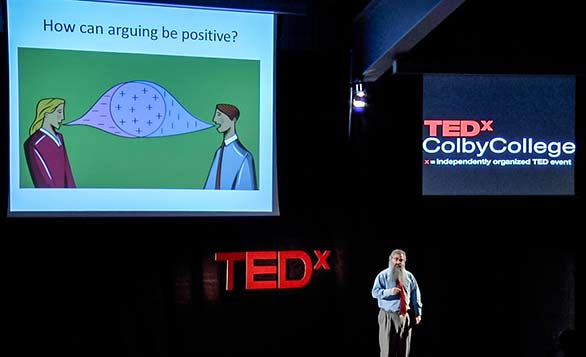
TEDxColbyCollege speaker Daniel H. Cohen talks about the subtleties of arguing — and how we shouldn’t think of it as a war.
Daniel H. Cohen argues for a good argument.
 Daniel H. Cohen: For argument's sake
In today’s talk, given at TEDxColbyCollege, Cohen asks us to set aside our goal of winning arguments in favor of gaining a greater appreciation for the legitimate points being made by the other person.
Daniel H. Cohen: For argument's sake
In today’s talk, given at TEDxColbyCollege, Cohen asks us to set aside our goal of winning arguments in favor of gaining a greater appreciation for the legitimate points being made by the other person.
In an effort to gain more appreciation for that argument, we asked Cohen if he would answer a few of our questions over email. Read his answers below and, please, feel free to argue with them in the comments.
What is the best argument you’ve ever had?
There are quite a few that stand out — beginning with one late-night argument with a couple of other philosophy majors when I was an undergraduate on the nature of reality, focusing on Spinoza’s monism versus pluralistic and atomistic approaches. What made it so remarkable was that, over the course of the argument — which lasted several hours — all of our positions evolved to the point that I think everyone involved managed to occupy and defend each position at some point. The result: no clear winner, but we all came away with a much greater understanding and appreciation for all of these philosophies.
I should also mention an ongoing realism/anti-realism argument that I’ve been having with a poet … for the last 30 years! I’m not sure how much progress we’ve made towards any real resolution, but it’s convinced me that progress and resolution are not the most important measures of argumentation.
What defines an argument? Does this come close: Before an argument, two or more people have a set of incompatible beliefs and, over the course of the argument, some of those beliefs are refined to form compatible beliefs.
As you might expect, I’m not keen on overly adversarial conceptions of argument, nor on exclusively epistemic accounts of what arguments are about. There can be other things at stake besides beliefs. We can argue about what to do, what attitudes to take, how to understand things, etc. It is true that we can always shoehorn differences into questions about beliefs, but that’s a Procrustean Bed that fits some arguments better than others. Ideally, there will be cognitive changes resulting from arguments, but there are more cognitive achievements than acquiring, jettisoning or changing beliefs.
In your talk, you’re discussing theoretical arguments. Is there a fundamental difference between practical arguments about taking action (like who should take out the trash, or whether to bomb another country) and arguments about abstract concepts?
There are many differences — many of which are both very large and very important. But I’m not sure I have a good, short answer, except to say that a good arguer will argue differently when the goal is simply getting her way than when the goal is to convince someone of something. As Michael Gilbert likes to point out, if an argument about the empty gas tank in the car that one friend lent to another threatens to destroy their 20-year friendship, you know that the argument isn’t really about the empty gas tank. And I would add that any friends who would allow an argument about an empty gas tank to undermine their friendship aren’t very good arguers — and probably weren’t really very good friends.
Should arguments always have conclusions?
Heavens, no! If that 30-year argument I’ve been having with the poet ever ended, I’d miss it terribly. Arguing can be a very positive form of connection and communication, but it requires good arguers to keep it that way.
Comments (1)
Pingback: Making Personal Change | prosperosworld.com